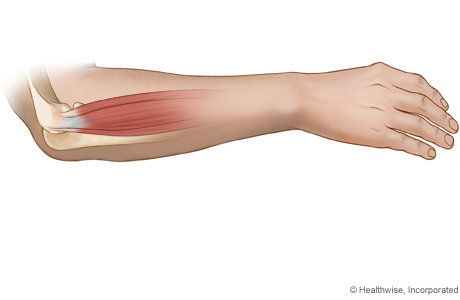
Overview
An elbow sprain occurs when your child overstretches or tears the ligaments around the elbow. Ligaments are the tough tissues that connect one bone to another. A sprain can happen when your child falls, plays sports, or does chores around the house.
Most sprains will heal with some treatment at home.
Follow-up care is a key part of your child's treatment and safety. Be sure to make and go to all appointments, and call your doctor if your child is having problems. It's also a good idea to know your child's test results and keep a list of the medicines your child takes.
How can you care for your child at home?
- Follow your doctor's directions for having your child wear a splint, an elbow pad, a sling, or an elastic bandage. Wrapping the elbow may help reduce or prevent swelling.
- Make sure your child rests and protects the elbow. Do not allow any activity that hurts the elbow.
- Apply ice or a cold pack to your child's elbow for 10 to 20 minutes at a time to reduce swelling. Try this every 1 to 2 hours for 3 days (when your child is awake) or until the swelling goes down. Put a thin cloth between the ice and your child's skin.
- After 2 or 3 days, if the swelling is gone, apply a warm cloth to the elbow. This helps keep the arm flexible. Some doctors suggest that you go back and forth between hot and cold. Keep the splint dry.
- Prop up your child's elbow on pillows while you apply ice or anytime your child sits or lies down. Try to keep the elbow at or above the level of the heart to help reduce swelling.
- Be safe with medicines. Give pain medicines exactly as directed.
- If the doctor gave your child a prescription medicine for pain, give it as prescribed.
- If your child is not taking a prescription pain medicine, ask your doctor if your child can take an over-the-counter medicine.
- Let your child return to their usual level of activity slowly.
When should you call for help?
Call your doctor now or seek immediate medical care if:
- Your child's pain is worse.
- Your child has new or increased swelling in the elbow or hand.
- Your child cannot bend the arm.
- Your child has a fever.
- Your child's elbow looks red.
- Your child has tingling, weakness, or numbness in the elbow, hand, or fingers.
Watch closely for changes in your child's health, and be sure to contact your doctor if:
- The pain is not better after 2 weeks.
Where can you learn more?
Go to http://www.healthwise.net/patientEd
Enter N507 in the search box to learn more about "Elbow Sprain in Children: Care Instructions".
Current as of: July 31, 2024
Author: Ignite Healthwise, LLC Staff
Clinical Review Board
All Healthwise education is reviewed by a team that includes physicians, nurses, advanced practitioners, registered dieticians, and other healthcare professionals.

